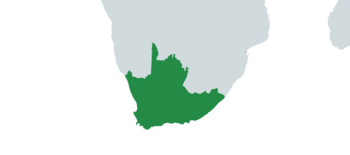The Cape
The Cape Commonwealth | |
|---|---|
| Motto: Van velen, één (Dutch) Ukususela kwabaninzi, enye (Xhosa) "From Many, One" | |
| Anthem: "Ode to the Cape" | |
 | |
| Capital and largest city | Cape Town |
| Official languages | |
| Ethnic groups (2023) | 58.3% Black 30.4% Coloured 9.7% White 1.4% Asian 0.4% Other |
| Demonym(s) | Capian |
| Government | Unitary parliamentary constitutional monarchy |
• Monarch | Alexandra |
• Governor-General | Masakhane Jadezweni |
• Prime Minister | Oscar Mabuyane |
| Legislature | Parliament |
| Senate | |
| House of Representatives | |
| Independence from the United Kingdom | |
| 1652 | |
| 1806 | |
| 1931 | |
| 1976 | |
| Area | |
• | 671,317 km2 (259,197 sq mi) (41st) |
| Population | |
• 2023 estimate | 16,014,433 (73rd) |
• Density | 23.8/km2 (61.6/sq mi) (208th) |
| GDP (PPP) | 2023 estimate |
• Total | $961 billion (35th) |
• Per capita | $60,008 (27th) |
| GDP (nominal) | 2023 estimate |
• Total | $600 billion (25th) |
• Per capita | $37,505 (27th) |
| Gini (2023) | medium |
| HDI (2023) | high (81st) |
| Currency | Cape dollar (CAD) |
| Time zone | UTC+2 (UTC) |
| Driving side | left |
| Calling code | +26 |
| Internet TLD | .cp |
The Cape, officially The Cape Commonwealth, is a country in Southern Africa. Named after the Cape of Good Hope, The Cape is bordered by South Africa to the east, Namibia and Botswana to the north, and is surrounded by the Atlantic Ocean to the west and south.
Situated in the southernmost area of Africa, The Cape's history began with the Dutch colonisation of the area in the 17th century that resulted in the establishment of the Dutch Cape Colony by the Dutch East India Company. In 1795, the Battle of Muizenberg saw British forces occupy the colony for the first time, only to temporarily cede it back to the Dutch in 1806 via the Treaty of Amiens. However, in 1806, British forces invaded for a second time, and in the aftermath of the Battle of Blaauwberg, took permanent control of the colony and subsequently renamed it to the British Cape Colony, a self-governing colony located nearby other British colonies in the area, namely the colonies of Natal, Orange River, and Transvaal. However, unlike the three other colonies, The Cape went on to develop a distinct system of non-racial franchise known as the Cape Qualified Franchise which, in 1910, proved a decisive factor for the colony's refusal to join the newly-formed Union of South Africa over fears of its multi-racial franchise system being eroded by the South African government. In 1931, the passing of the Statute of Westminster 1931 saw the country officially receive dominion status alongside the likes of Canada, Australia, and New Zealand before later attaining full independence in 1976 as a constitutional monarchy with the British monarch as its head of state, a status that it currently retains as the only African country to do so.
A constitutional monarchy, The Cape's head of state is the British monarch who, in turn, is represented by a governor-general. The head of government is an elected prime minister, currently Oscar Mabuyane. The country's legislature, based largely on the Westminster system, is bicameral in nature, being made up of the Senate and the House of Representatives. In contrast to neighbouring South Africa, whose infamous apartheid system saw the country only grant full, universal suffrage in 1994, The Cape bas implemented universal suffrage since 1956 when it was granted on the 150th anniversary of the country's foundation.
Considered a high-income economy and one of Africa's most prosperous nations, The Cape is a member of various international organisations including the United Nations, Commonwealth of Nations, G20, World Trade Organization, and the African Union, of which it is a founding member. Along with South Africa, it is currently one of only two nations in Africa to have legalised same-sex marriage. With a nominal economy worth $600 billion, The Cape possesses the largest economy in Africa while its human development index is among the highest alongside Libya, Seychelles, and Mauritius.